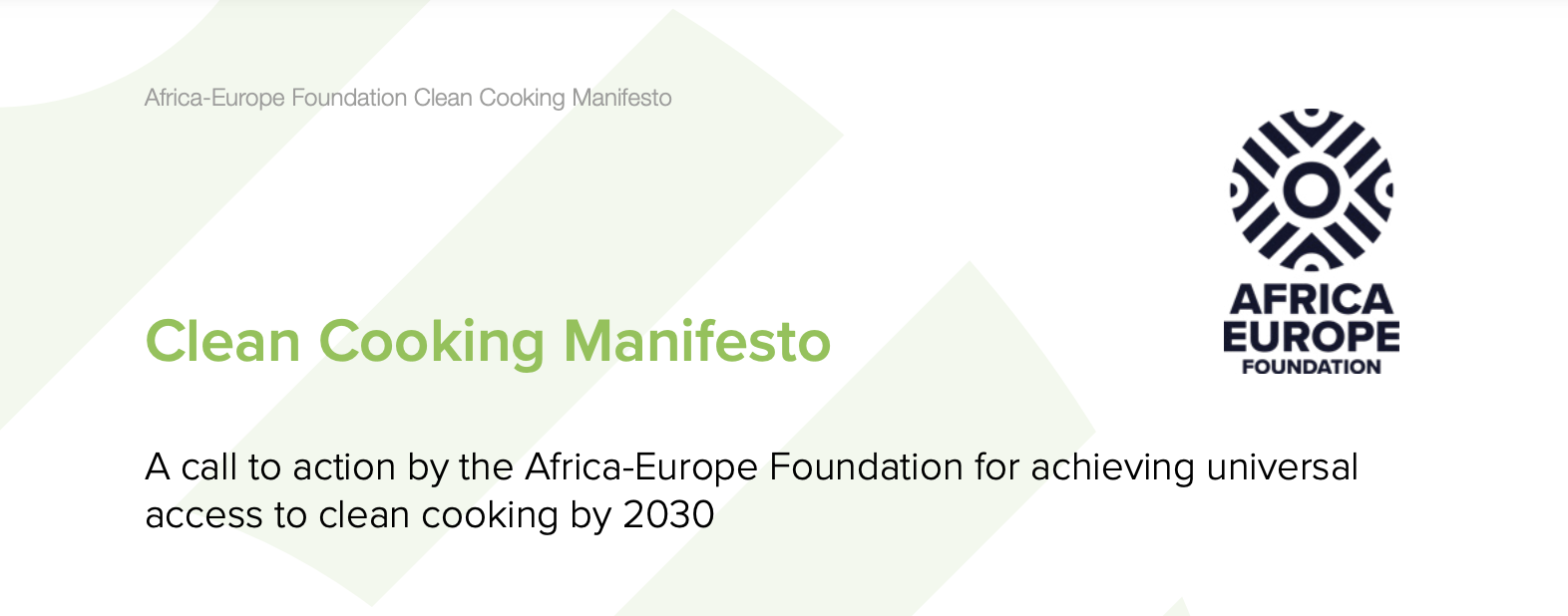ENERGIA is pleased to support the Africa-Europe Foundation Clean Cooking Manifesto. This is a collective action agenda for achieving universal access to clean cooking by 2030.
The Clean Cooking Manifesto, signed by over 65 high-level personalities and organisations from across Africa and Europe, urges governments, development partners and the private sector to adopt a collective action agenda on clean cooking, to ensure that billions around the world can prepare food in a safe, clean and affordable way.
Commenting on the launch of the Manifesto, H.E. Ellen Johnson Sirleaf, Honorary President of the Africa-Europe Foundation and former President of the Republic of Liberia said: “All across Africa, women’s and children’s health, as well as landscapes’ vitality are damaged day after day due to reliance on wood fuel and charcoal. Let’s turn this around and invest in clean cooking solutions. Delivering clean cooking solutions to millions of households in low- and middle-income countries in Africa is far from a menial, ‘housekeeping’ topic, and must become a shared priority for Europe and Africa.”
Dymphna van der Lans, Member of the Africa-Europe Foundation Women Leadership Network and Strategy Group on Energy, and CEO of the Clean Cooking Alliance said: “Clean cooking urgently needs to be integrated into bolder national plans, supported by efficient financing and delivered by a robust clean cooking industry. This is the right time for the Clean Cooking Manifesto to guide governments, development and finance institutions, and the private sector to elevate clean cooking as an important opportunity to deliver vital climate, health, and economic outcomes through true collective action.”
Kandeh Yumkella, Co-chair of the Africa-Europe Foundation Strategy Group on Energy, Member of Parliament in Sierra Leone and former Chief Executive Officer of Sustainable Energy for All said: “Lack of access to clean cooking solutions is a silent tsunami killing over 4 million people every year, which is as much as the current COVID-19 pandemic. This Manifesto we launched today is the product of collaboration of public and private institutions and lays out an action agenda to save lives, protect the environment and spur economic development.”
Sheila Oparaocha, Member of the Africa-Europe Foundation Strategy Group on Energy, ENERGIA’s International Coordinator and recipient of the Sixth Annual Carnot Prize said: “We need to include both clean cooking and gender in energy policies, planning and programs. Women are the main users of cooking fuels, yet they are also dramatically underrepresented in the clean cooking value chain, from producing and distributing products to entrepreneurship and executive leadership. For a true inclusive transition to clean cooking, it is crucial for governments, the private sector and development actors to join forces and develop policies, allocate funding and implement programmes that are gender inclusive.”
The Manifesto identifies 10 immediate actions to ensure clean cooking for all is achieved by 2030:
- Ensure a just energy transition that leaves no one behind
- Integrate clean cooking into nationally determined contributions (NDCs) and national energy
planning - Create and resource governmental clean cooking ‘delivery units’
- Enact favourable and stable fiscal policies to sustain business growth and increase affordability
- Support countries to develop appropriate policy frameworks and technical support to enable the rapid growth of clean cooking solutions
- Increase funding to match the magnitude of the clean cooking challenge
- Develop sustainable markets that deliver clean and affordable solutions
- Increase private sector investment in clean cooking solutions
- Build stronger partnerships with the electricity sector to advance electric cooking
- Increase participation of women and integrate gender issues
Bold action must be taken to ensure that billions of people have the means to prepare food in a safe, clean and affordable way.
Download the Clean Cooking Manifesto: here.
Sheila Oparaocha presents the Manifesto: Why is this timely, critical and urgent?
The evidence from SDG 7 progress tracking reports speak for themselves, and show us that with fewer than 10 years until we reach 2030, the world remains far off track to meet SDG 7 – which commits to ensure access to affordable, reliable, sustainable and modern energy for all.
Nearly 2.6 billion people still lack access to modern cooking solutions, and the COVID-19 pandemic threatens to reverse progress and further exacerbate inequalities. Equally challenging, is that to date, the level of commitment and investment in clean cooking has not matched the global magnitude of the challenge. Considering the annual toll on human health, forests, climate and local economies, clean cooking solutions should be central to global transformative strategies and to national and city recovery plans.
Three pillars central to this transformation are governments, development actors and private sector who are urged to align with each other and to work with other stakeholders with a greater sense of urgency and innovation, elevating clean cooking within energy, climate and development agendas.
The next 12 months are of critical importance, with the UN High-Level Dialogue on Energy in Sept, the 26th UN Climate Change Conference (COP26) in Nov and the Africa-Europe political summit of heads of state in February 2022.
These milestones provide members states, CEOs, sector leaders an opportunity to make momentous progress on climate protection, health, the environment and women’s empowerment through Ambitious commitments and concrete actions to achieve universal access to clean cooking that in turn would be one of the most significant levers to achieving both climate and development goals.
❓ Why has the #AfricaEuropeFoundation pushed for a new #CleanCooking manifesto? @energia_org‘s Sheila Oparaocha explains the importance of this issue in achieving #SDG7. Read it below!
↪️https://t.co/XEWmwHp3nB pic.twitter.com/MBohQecRrB— Africa-Europe Foundation (@AfricaEuropeFdn) July 19, 2021







